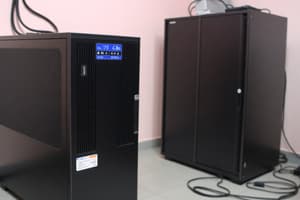Podcast
Questions and Answers
Apa peran sistem Uninterruptible Power Supply (UPS) dalam aplikasi kritis?
Apa peran sistem Uninterruptible Power Supply (UPS) dalam aplikasi kritis?
- Menyediakan daya yang stabil dan tak terputus (correct)
- Menghemat energi
- Meningkatkan kinerja peralatan
- Mengurangi biaya operasional
Berapa persentase pangsa pasar UPS double-conversion untuk UPS di atas 200 kVA?
Berapa persentase pangsa pasar UPS double-conversion untuk UPS di atas 200 kVA?
- 80-90%
- 90-95%
- 95-97%
- 99% (correct)
Apa kekurangan dari sistem UPS pasif-standby?
Apa kekurangan dari sistem UPS pasif-standby?
- Biaya operasional yang tinggi
- Waktu respon yang lambat (correct)
- Kapasitas yang terbatas
- Tidak efisien
Apa kelebihan dari sistem UPS double-conversion?
Apa kelebihan dari sistem UPS double-conversion?
Apa kelebihan dari sistem UPS line-interactive?
Apa kelebihan dari sistem UPS line-interactive?
Apa yang menyebabkan kerusakan pada peralatan elektronik sensitif di pusat data?
Apa yang menyebabkan kerusakan pada peralatan elektronik sensitif di pusat data?
Mengapa sistem UPS masih dipilih untuk menyediakan pasokan daya listrik yang tidak terputus pada aplikasi kritis?
Mengapa sistem UPS masih dipilih untuk menyediakan pasokan daya listrik yang tidak terputus pada aplikasi kritis?
Apa konsekuensi dari downtime pada pusat data?
Apa konsekuensi dari downtime pada pusat data?
Bagaimana sistem UPS membantu dalam proses manufaktur?
Bagaimana sistem UPS membantu dalam proses manufaktur?
Apa tantangan yang dihadapi oleh power-quality microgrids dalam bersaing dengan sistem UPS?
Apa tantangan yang dihadapi oleh power-quality microgrids dalam bersaing dengan sistem UPS?
Flashcards are hidden until you start studying
Study Notes
Uninterruptible Power Supply (UPS) in Critical Applications
Uninterruptible Power Supply (UPS) systems play a crucial role in ensuring uninterrupted power supply to critical applications and equipment, particularly in modern data centers and sensitive manufacturing processes. UPS systems are designed to provide power to loads without any interruption during power outages or voltage sag events that can damage or disrupt operations. In this article, we will discuss the importance of UPS systems and their role in providing reliable power to critical applications.
UPS Classification
UPS systems are classified into three main categories: passive-standby, double-conversion, and line-interactive.
-
Passive-Standby: These systems provide backup power for an immediate transfer if a power failure occurs. They are not used in large UPSs due to their slow response time and lack of isolation from grid disturbances.
-
Double-Conversion: These systems convert the AC input to DC and then back to AC, providing complete isolation from the grid disturbances. They are the most popular choice for medium and high power UPSs, accounting for 80% to 97% market share in UPSs 5-200 kVA and 99% in UPSs over 200 kVA.
-
Line-Interactive: These systems, which include delta-conversion UPSs, are gaining market share in higher power applications due to their higher efficiency and nearly complete isolation from grid disturbances through a series converter.
Importance of UPS in Critical Applications
In the context of data centers, UPS systems are essential for maintaining the high level of power quality necessary for the sensitive electronic equipment stored in these facilities. A momentary power outage or voltage sag can cause significant damage to equipment and lead to downtime, which can result in significant financial losses.
In manufacturing processes, UPS systems are crucial for maintaining the consistency and quality of the products being produced. Any disruption in the power supply can lead to defects or inconsistencies in the final product, which can have severe consequences for the company's reputation and bottom line.
Challenges and Competition
Power-quality microgrids, which can potentially provide uninterruptible power supply, face several challenges in competing with UPS systems, especially in the power-quality market. These challenges include increased focus on energy efficiency, customer perception against exposing critical loads to grid disturbances, and the high cost of seamless islanding.
Despite these challenges, UPS systems continue to be the preferred choice for providing uninterruptible power supply to critical applications. The double-conversion topology, which dominates the market for medium and high power UPSs, offers complete isolation from grid disturbances, which is crucial for maintaining the integrity of critical loads.
In conclusion, UPS systems play a vital role in ensuring uninterrupted power supply to critical applications and equipment. Their ability to provide complete isolation from grid disturbances makes them the preferred choice for maintaining power quality in data centers and manufacturing processes. While power-quality microgrids may face challenges in competing with UPS systems, the importance of uninterruptible power supply in critical applications remains unquestionable.
Studying That Suits You
Use AI to generate personalized quizzes and flashcards to suit your learning preferences.




